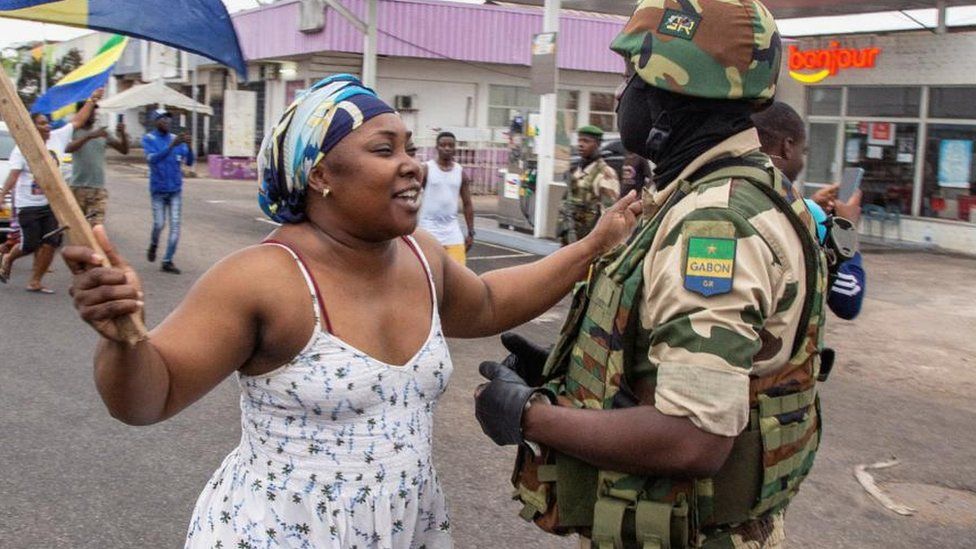In a recent statement released by the US State Department, Secretary of State Antony Blinken expressed concern over the political turmoil in Gabon following a coup that took place last month. While the United States remains committed to its operational activities in the country, including diplomatic and consular operations, it has decided to withhold certain foreign assistance programs intended for the Gabonese government. In this article, we delve into the details of the situation, the reasons behind the US decision, and the implications for Gabon.
The Coup in Gabon: A Brief Overview
The coup in Gabon unfolded on August 30th when military officers seized power. This abrupt move came shortly after an announcement that President Ali Bongo had won the election, a result the military deemed non-credible. Ali Bongo had been in power since 2009, leading a dynastic rule that had faced significant criticism for its alleged failure to distribute the country’s wealth among its 2.3 million citizens.

International Response and Support
The United States’ decision to pause certain foreign assistance programs aligns with the actions taken by the Economic Community of Central African States, the African Union, and other international partners. These organizations have condemned the coup and called for a return to constitutional order.
In particular, the African Union has suspended Gabon’s membership following the military intervention. This underscores the widespread international concern over the situation in Gabon and the need for a peaceful and democratic resolution.
US Evaluation of the Situation
Secretary of State Antony Blinken emphasized the need to evaluate the “unconstitutional intervention” by members of the Gabonese military. This evaluation is crucial for the United States to determine its future course of action and to ensure that any assistance provided aligns with democratic principles and respect for human rights.
The Role of General Brice Nguema
Following the coup, General Brice Nguema emerged as a key figure in Gabon’s political landscape. He was inaugurated as Gabon’s interim President on September 4, 2023. General Nguema has pledged to oversee free and fair elections in the country, although a precise timetable for these elections has not yet been provided. The international community, including the United States, will be closely monitoring the junta’s commitment to democratic processes.
A Reasonable Transition Period
Raymond Ndong Sima, the junta-appointed Prime Minister, stated that a 24-month transition period to elections in Gabon would be “reasonable” after last month’s coup. This transition period is expected to be a critical phase in Gabon’s journey towards restoring stability and ensuring that the voices of its citizens are heard in the electoral process.
Implications for Gabon
The decision by the United States to withhold certain foreign assistance programs will undoubtedly have economic and political ramifications for Gabon. The country relies on foreign aid for various developmental projects and initiatives. The pause in assistance underscores the international community’s commitment to upholding democratic values and principles.
Conclusion
In conclusion, the United States’ response to the coup in Gabon reflects its commitment to democratic governance and respect for constitutional order. While the pause in certain foreign assistance programs may pose challenges for Gabon, it serves as a powerful message that the international community is closely watching and expects a return to democratic processes. General Nguema’s leadership and the junta’s commitment to organizing free and fair elections will be pivotal in determining Gabon’s future trajectory.
FAQs
- Why did the United States withhold foreign assistance from Gabon?
The United States decided to withhold certain foreign assistance programs due to concerns about the unconstitutional military intervention in Gabon following the recent coup. This decision aligns with international efforts to promote democratic principles. - What is the African Union’s stance on Gabon following the coup?
The African Union suspended Gabon’s membership in response to the coup, highlighting the organization’s strong condemnation of the military intervention and its commitment to democratic governance. - Who is General Brice Nguema, and what role does he play in Gabon’s political landscape?
General Brice Nguema is the interim President of Gabon following the coup. He has pledged to oversee free and fair elections in the country, although a specific timetable has not been provided. - How long is the proposed transition period to elections in Gabon?
Junta-appointed Prime Minister Raymond Ndong Sima stated that a 24-month transition period to elections in Gabon would be considered “reasonable” after the coup. - What are the implications of the United States’ decision for Gabon?
The pause in certain foreign assistance programs will have economic and political implications for Gabon, as the country relies on foreign aid for various developmental projects. However, it also underscores the international community’s commitment to democratic values and principles.